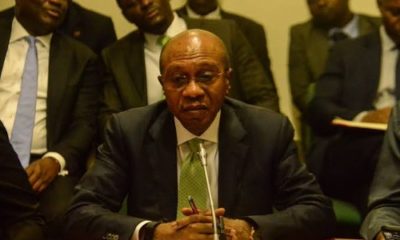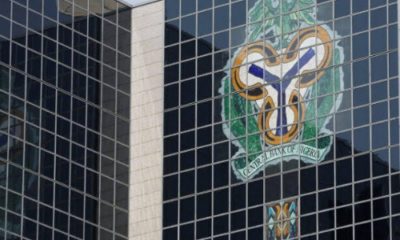Finance
Nigerian Govt probes NNPC, NPA, NIMASA over dollar remittances

Oscarline Onwuemenyi
ABUJA – The Federal Government has commenced probe into activities of its agencies over remittance of revenue into the Federation Account
This was disclosed yesterday at the meeting of the National Economic Council, NEC, by the Governor of the Central Bank of Nigeria, CBN, Godwin Emefiele.
Emefiele told the Council how some Federal Government agencies short changed the country by remitting naira into the Federation Account instead of the dollar revenue they collected.
 Briefing journalists at the Presidential Villa after the meeting, Cross River State Governor, Ben Ayade said the CBN Governor presented brief report on government agencies involved in the inappropriate remittance.
Briefing journalists at the Presidential Villa after the meeting, Cross River State Governor, Ben Ayade said the CBN Governor presented brief report on government agencies involved in the inappropriate remittance.
According to Ayade, the agencies include the Nigerian National Petroleum Corporation (NNPC), Nigerian Maritime Administration and Safety Agency (NIMASA) and the. Nigerian Port Authority (NPA) among other agencies.
Ayade said, “We received a brief report on how agencies remitting dollar revenues in naira into the Federation account given by the CBN governor. He said investigations are on-going. Such agencies include but not limited to NNPC, NIMASA and NPA.”
Ayade also said NEC received briefing on the excess crude account which stands at $2.2bn as at yesterday.
He added: “On the provision of provisional loans to states based on collaterisation of the excess crude account, the CBN governor briefed that 27 states have made request for the N10bn facility and is currently being processed.
“He has called on the affected states to complete all necessary documentation for the money. Not all states have indicated interest on this ECA collaterised loan.
“On the refund of expenses incurred by state government, the Vice President also briefed Council on detail of this and said that for all those who have followed the right procedure and due process in incurring expenses, processes are being undertaken at this time to ensure refund for such Federal Government based road expenditure by states.”
Meanwhile, the. NNPC yesterday conducted the public opening of bids tendered by 101 Nigerian and multi-national companies competing for the award of Offshore Processing Arrangements, OPA.
According to a statement by the Group General Manager, Group Public Affairs Division, Ohi Alegbe, in the OPA, NNPC undertakes to allocate a dedicated volume of crude oil for refining at offshore locations in exchange for petroleum products at pre-agreed yield pattern.
The exercise, which was said to have been broadcast live on national television and conducted in the full glare of representatives of Nigerian Extractive Industry Transparency Initiative (NEITI), executives of the bidding companies and other crucial oil and gas industry stakeholders comes as a swift departure from the previous OPA award exercises which were conducted without public participation.
The statement quoted the Group Managing Director of NNPC, Dr. Ibe Kachikwu, to have noted that the Corporation has taken the pain to make the process leading up to the award open to public scrutiny to demonstrate before all members of the public that there was nothing to hide.
“At the end of this exercise, we must be able to engage companies that are known to everybody and not shrouded in mysteries. We must have terms that are very transparent and comparative to terms anywhere else in the world where OPA are being done,” Kachikwu said.
He said while efforts were being made to ensure that refineries were re-streamed to optimal levels, NNPC would in the interim maximise the OPA in such a way as to secure the best deals possible for Nigeria.
“I hope that we should be able to build in futuristic growth patterns in the new deal. We should be able to come up with companies that have solid investments in Nigeria because this is not just a trading issue,’’ he said.
Commenting on the exercise, Mrs. Murjanatu Gamawa, representative of NEITI commended NNPC for the giant step taken towards transparency and accountability.
Managing Director, Pipelines and Products Marketing Company Limited, PPMC a subsidiary of the NNPC, Mrs. Esther Nnamdi-Ogbue, stated that the essence of the exercise was to provide a level playing field for all industry players and to cut-off middle men who have been exploiting the system.
Mrs. Gamawa observed that this was the first time NEITI would be invited to witness a bid process at the NNPC, noting that it was a clear indication that the Corporation takes transparency and integrity issues seriously.
Sweetcrudereports-
Banking
CBN Denies Currency Devaluation

The Central Bank of Nigeria (CBN) has refuted claims of devaluing the.
Earlier reports suggested that the CBN had devalued the Naira, lowering its exchange rate from N631 to the dollar, compared to the previous day’s rate of N461.60 at the Importers and Exporters (I&E) window.
However, the Central Bank of Nigeria (CBN) released a statement on Thursday through its Acting Head of Corporate Communications, Dr. Isa Abdulmumin, categorizing the report as false information.
In the statement titled ‘CBN Has Not Devalued The Naira’, he said the attention of the apex bank was drawn to the news report by an Abuja based newspaper edition of June 1, 2023, titled “CB Devalues Naira To 630/51”.
However, the CBN stated categorically that the news report was replete with outright FALSEHOODS and destabilizing innuendos, ‘reflecting potentially willful ignorance of the said medium as to the workings of the Nigerian Foreign Exchange Market.’
“For the avoidance of doubt, the exchange rate at the Investors’ & Exporters (I&E) window traded this morning (June 1, 2023) at N465/USS1 and has been stable around this rate for a while.
“The public is hereby advised to ignore the news report by Daily Trust in its entirety, as it is speculative and calculated at causing panic in the market,” the CBN spokesman added.
He, therefore, advised media practitioners to verify their facts from the Central Bank of Nigeria before publishing in order not to misinform the public.
Banking
BREAKING: CBN Increases Interest Rate By 0.5%

The interest rate in Nigeria has been raised to 18.5 percent, up by 0.5 percent, from 18 percent where it was pegged in March 2023.
The Central Banks of Nigeria’s (CBN) Monetary Policy Committee (MPC) resolved to this effect at its third meeting of 2023 in Abuja, on Wednesday.
Governor, CBN, Godwin Emefiele, made the disclosure in the communiqué of the MPC’s meeting, thereafter.
While engaging the media at the end of the two-day meeting, Emefiele, said the committee voted to keep the asymmetric corridor at +100 and -700 basis points around the MPR.
In the view of the MPC, rising inflation rate is traceable to the high energy cost and challenges around the supply chain, among others, which lie outside the corridors of the CBN.
Emefiele said, “The current trend in price development would continue to be monitored by the bank with greater collaboration with fiscal authority to address the drivers of inflation.”
Biztellers reports that the CBN had effected six consecutive interest rate increases, which has seen the rate move from 11.5 percent in March 2022 to 18.5 percent in May 2023.
Finance
Dangers Lurk As Nigerians Resort To Refurbished Gas Cylinders

In Nigeria, people have been forced to come up with creative solutions to cope with the effects of inflation and the economic crisis.
These improvised strategies have not only helped individuals save money, but also enabled them to stay afloat during difficult times.
In a concerning development, the recent trend of boycotting the high cost of cooking gas cylinders in Nigeria may pose a greater risk to lives than it does in terms of saving money.
Economy&Lifestyle investigations have revealed that the soaring prices of gas cylinders have reached a point where it has become increasingly challenging for average households to afford them, let alone refill them with gas.
The situation is further exacerbated by the fact that the pump price of kerosene, which would typically serve as an alternative, has become prohibitively expensive.
Upon investigation, it was found that the prices of gas cylinders vary depending on their sizes. A 3kg gas cylinder is priced at N14,000, while a 5kg cylinder costs N16,000. The larger cylinders are even more costly, with a 6kg cylinder priced at N17,000 and a 12.5kg cylinder costing N19,000.
Additionally, the expense continues when it comes to filling these cylinders with cooking gas, as it costs N2,600 for a 3kg cylinder, N5,200 for a 6kg cylinder, N8,950 for a 10.5kg cylinder, and N10,650 for a 12.5kg cylinder.
Consequently, an average household that needs to replace a worn-out 5kg cylinder would have to come up with N20,250 to purchase a new cylinder and fill it with gas, which can be a difficult feat to achieve.
As a result, many people have resorted to refurbishing their old cylinders and trying to use them as best as they can. However, this approach poses a significant danger.
Mrs. Rukayat Adesoji, a trader, shared her experience regarding her gas cylinder, which had become rusted and could no longer stand upright since last month. Due to the exorbitant prices of purchasing new cylinders, she resorted to seeking the assistance of a welder.
The welder patched the legs of the cylinder, repainted it, and ever since then, she has been using the refurbished cylinder for her cooking needs.
She said ““My gas cylinder which was 6kg got rusted and no longer stands erect since last month. When I asked for the price, I was told it was N17, 500. I was discussing it with a friend who advised me to take it to a welder to paint it and construct a new stand. I heeded to her advice and at the end spent just N3, 000 to turn my cooking gas to a brand new.”
Apart from refurbishing cylinders, some people don’t even know when their cylinders will expire. Mrs. Mercy Opara, a hair stylist, falls in that category as she explained: “I am taking my gas cylinder to the welder to spray it for me. It just cost N1, 500.
“The cost of buying a new cylinder is high. I have been using my cylinder for over 7 years and I don’t even know the expiry date. I just pray God blesses me so that I can buy a new one. But this one I am managing will look neat after spraying it for another two years.”
Mr. Adekanbi Joseph, a wielder, said he paints cylinder and “To paint and rebuild a cylinder stand, I charge N4, 500. Many people come here to paint as a new cylinder is now very expensive to get.”
Highlighting the potential dangers of using refurbished cylinders, Mr. Benjamin Hope, the Chief Executive Officer of FKT Cooking gas and general goods, emphasized the risks involved.
He stated that even a brand new cylinder can pose a risk of explosion if the locks are not properly secured after use or if the cylinder filled with gas is moved from one location to another.
He said “A brand new cylinder can explode if the locks are not well keyed after using and if the cylinder filled with gas was moved from one place.
“There are many reasons for the high cost of gas cylinders in Nigeria. One is the cost of importation due to the exchange rate. Another is the increased migration from the use of kerosene to cooking gas which has necessitated increased demand for gas cylinders. You know that in such a case there will be increased importation of cylinders.”he added





















